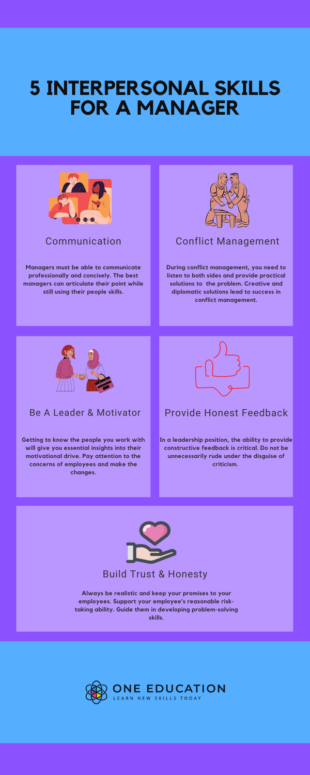Interpersonal skills are essential to driving business management success. Interpersonal skills for a manager is needed to build up communication with their direct reports. Besides, other employees can also benefit from having a manager with good people skills.
Additionally, interpersonal skills for a manager are essential to increase the chances of getting a job. Therefore, employers look for valuable interpersonal skills along with relevant industry skills while recruiting for managerial positions. Hence, a good manager needs to be skilled in communication and decision-making, among others.
What are Interpersonal Skills?
Interpersonal skills are essential employability abilities. The term “employability” is a good indicator of the value of interpersonal skills because hiring managers don’t want to recruit applicants who lack interpersonal skills.

Many jobs require regular, if not continuous, contact with others. Even for occupations that seem to prefer introverted personalities and autonomous work styles, this is valid. Even if you work as a software engineer, writer, or statistician, you must interact and collaborate with your colleagues. In your cover letter and resume, make sure to highlight your interpersonal skills. And then back up your statements with evidence.
5 Interpersonal Skills for A Manager
Interpersonal skills affect nearly every aspect of the business. For example, your people skills come into play when you enter into a negotiation.

It assists you in closing a business deal or wooing a customer. Furthermore, it will assist you in creating collaborations and a cohesive team atmosphere. These interpersonal skills for a manager can help you become an effective leader as well.

1. Communication
It is one of the most important interpersonal skills for a manager. When leading a team, communication is crucial.

Managers must be able to communicate professionally and concisely. In addition, they must have the necessary vocabulary to communicate effectively. Otherwise, the employees would be confused and struggle while completing their assignments.
There is, however, a distinction to be made between communicating and communicating effectively. The best managers can articulate their point while still using their people skills. A skilled manager ensures that the other individual recognises the mission. And, most importantly, that employees are invested in giving it their best.
All successful leaders must improve communication skills as an essential interpersonal ability or trait. Successful leaders must be able to communicate effectively. Leaders who lack organisational skills are more likely to adopt a command and control leadership style, which is only effective under some circumstances.
Be as concise as possible in your instructions and expectations. Be brief and descriptive. Don’t waste 100 words on something that could be said in 50.
Pay attention to what you don’t say. Non-verbal communication is just as practical as verbal communication. Moreover, non-verbal communication is much more profound in many instances.
During negotiations and interviews, facial expressions, hand motions, and body language can say a lot. For example, when addressing their staff, a leader who crosses their arms often may seem uneasy or distant. Likewise, during a conversation, a manager who can’t maintain eye contact may seem bored and uninterested.
It’s not so much what you say as it is how you say it that is remembered. So, always try to stay calm and keep your game face on! Do not lose your temper or get agitated before your subordinates. It might earn you some not so good work nicknames.
2. Conflict Management
As a manager, you must deal with conflicts. Disagreements over business goals or personality clashes can cause conflicts. Any team you lead will have members with a variety of personalities.

Their different experiences, strengths and weaknesses can sometimes cause them to overpower one another.
When a dispute occurs, you must interfere and try to settle it. However, coaching and teaching people how to handle problems on their own might be a safer solution. This will help you save time. Although disputes are unavoidable in any team, they can be anticipated and prepared for. During conflict management, you need to listen to both sides and provide practical solutions to the problem.
Use software like shadow match to calculate possible inception of clashes between employees. The software lets you know how compatible a team is, depending on the team members’ personalities.
Creative and diplomatic solutions lead to success in conflict management. Being able to think on your feet is an essential aspect of the interpersonal skills of a manager.
3. Strong Leadership
A manager’s duty extends beyond managing the team. You must lead and inspire your team to reach optimal success. It is a proven way to get the best out of the employees.

In most cases, you will be dealing with people who aren’t like anyone else. In terms of personality, every employee is distinct. Furthermore, employees come from different backgrounds and cultures. So, a generalised approach might not work with them all.
Getting to know the people you work with will give you essential insights into their motivational drive. No employee will follow your lead blindly. Tap into their sense of emotion and persuade them from a logical standpoint. Let the members know that you are here to make a change. Pay attention to the concerns of employees and make the changes.
Related:
1. 20+ Effective Communication Skills (Good for a Resume)
2. How to Develop Leadership Skills in the Workplace?
3. How to Improve Your Communication Skills in English?
4. How Do People Develop Cross Cultural Communication Skills?
4. Constructive Criticism
Providing honest feedback to colleagues and subordinates is crucial for a manager. It serves a variety of purposes for the company. The first and most apparent purpose is that you want your employees to perform at a consistently high standard.

In a leadership position, the ability to provide constructive feedback is critical. First, it is very beneficial to you and the business. Second, following is because it informs your staff of what they are doing well. Consequently, a feedback report suggests to employees what needs to be improved.
However, your team members should understand that your negative feedback is given with positive intentions. Do not be unnecessarily rude under the disguise of criticism. Often, managers and employers reprimand their subordinates in the name of constructive criticism. This approach does more harm than good. Your employees need to be supported and encouraged through your feedback, not insulted.
Remember, rude doesn’t equal honest and empathetic doesn’t mean watered down. On the contrary, honest feedback in a caring way leads to progression and professional development.
Hence, be honest and offer concrete solutions for improvement in the feedback. You will see that your employees will be more receptive to it rather than being defensive.
5. Build Trust & Honesty
Managers and their team members need to have confidence. Even if they trusted you as a teammate, you must now win their confidence as their manager. You need to inspire them and hold them accountable confidently and reasonably.

The new manager must deal with poor performance to reflect on the behaviour rather than the person. Authentically engaging your team while still trusting them is critical to establishing the necessary confidence. It will enable you to accomplish building trust and honesty.
Always be realistic and keep your promises to your employees. If you keep telling your workers things that never happen, you will lose their faith. Give a reasonable amount of time and space to your employees to finish the tasks. Don’t check in on them every hour to check http://www.gulfportpharmacy.com/ how far are they. It will erode trust in the relationship. However, if they do need assistance, instead of micromanaging, provide instruction to help them. Guide them in developing problem-solving skills.
Support your employee’s reasonable risk-taking ability. Help employees take the following steps when they choose to challenge themselves by taking on a new project. Furthermore, when they propose a new concept or require assistance in expanding their skillset, provide your full-fledged support. This demonstrates that you trust their abilities and ideas.
Explain the logic and evidence that went into making decisions and making assessments. Confidence between you and your staff is eroded when you keep your decision-making process hidden. It gives the impression that your choices are arbitrary and dictatorial. Instead, concentrate on being open and communicating effectively.
Remember, you don’t start trusting someone overnight. It’s about proving to your staff that you value them and believe in their abilities.
Conclusion
Interpersonal skills for a manager are essential now more than ever. It is crucial, particularly in a dynamic business environment. However, it’s critical to remember that you’ll need more than just technical skills or experience to thrive. Soft skills make you a people person. People must be able to confide in you for achieving maximum benefit. In the end, it’ll be these skills that distinguish you as a manager.
Further resources
- Communication And Interpersonal Skills in Food And Beverage Service
- The Importance of Effective Communication in Healthcare
- Effective Communication Skills For Social Workers
- 20 Great Jobs to Consider if you have Good Communication Skills
-
Why is Communication Skills of Physicians Important for Patients' Satisfaction?
-
How to Improve Your Interpersonal Communication Skills
- How Do People Develop Cross Cultural Communication Skills?
- Marriage Advice: The 8 Communication Skills of Happy couple
- 10 Essential Communication Skills for Workplace
- 10 Best Assertive Communication Worksheets and Techniques
- How to Tell Someone to Improve Their Communication Skills?
- 20+ Effective Communication Skills (Good for a Resume)
-
Different Types Of Communication: Everything You Need To Know
- A Definitive Guide To Basic Interpersonal Communication Skills
- The Importance of Listening Skills in Communication


 July 15, 2023
July 15, 2023
















